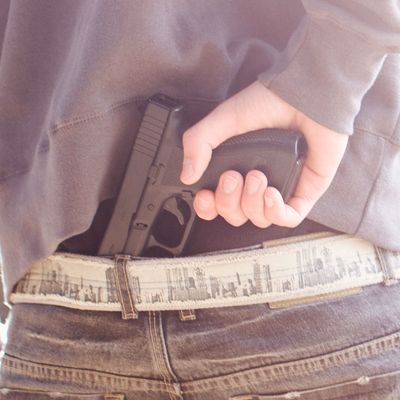
If you want to carry a loaded gun around the streets of Virginia, you need to take a short online gun-safety course. If you want to do so in New York City, you need to complete an arduous, expensive application and demonstrate a specific need for such a weapon.
But in Donald Trump’s America, a Virginian could legally bring a loaded gun to Times Square by taking route No. 1: The president-elect has argued that concealed-carry permits from any state “should be valid in all 50 states” — and the gun lobby hopes to pass that principle into law as soon as possible, The Guardian reports.
For groups like the National Rifle Association and the Second Amendment Foundation, allowing gun owners to fearlessly carry their firearms across state lines is the “civil rights” struggle of our time (as, once again, the enemies of liberty invoke “states rights” in a cynical bid to maintain oppression).
It’s true that the discrepancy between states’ standards creates confusion and inconvenience for gun lovers — armed tourists are routinely arrested at New York City airports for trying to bring in weapons they are not authorized to carry.
Advocates analogize their preferred system of “reciprocity” to drivers’ licenses, which are issued by individual states but accepted by all 50. But this comparison elides how disparate the standards for concealed-carry licenses are from state-to-state — and the fact that, in ten states, you can carry a gun with no license at all.
It’s not clear whether a national reciprocity law would completely gut local gun restrictions. While the legislation would allow out-of-state visitors to flout local firearm laws, advocates for gun control remain hopeful that state governments would retain the power to enforce more stringent regulations on their own residents. The challenge there would be to block any workaround that might allow a New York City resident to take a trip to Virginia, secure a permit, and come home with a legal handgun in tow.
The reciprocity law would also likely leave municipalities the right to ban visitors from carrying firearms into bars, schools, or other “gun-free” zones, Laura Cutilletta, managing attorney at the Law Center to Prevent Gun Violence, told The Guardian.
Regardless, it seems likely that Trump will move on reciprocity — or some other priority of the gun lobby — at some point in his first term. The NRA was one of the most avidly pro-Trump GOP interest groups throughout the 2016 campaign, and the president-elect’s base is even more heavily concentrated in rural areas than those of previous Republican presidents.
Plus, Trump has amends to make with the firearm industry — he has already cost them a lot of money.






























